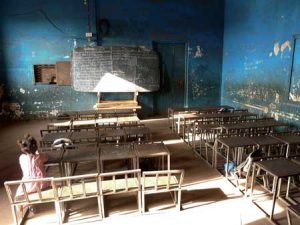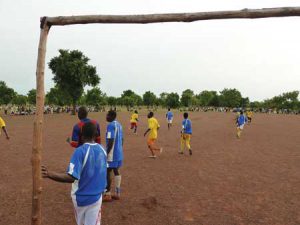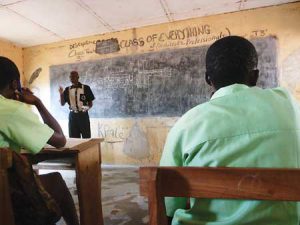
By Pascal G. Richard
As the big red sun reaches the horizon, the last whistle of the game is blown. Far away in the field scattered with shea and baobab trees, the Fulani boys bring the cattle back for the night. We gather around the coach to have one last talk. The rains have come and soon we will trade the ball for the hoe and a tractor will come to plough the football field, a full acre belonging to the village chief. I am tired from the day in town that is a full hour bike ride away from Sanga, my host community.
In the evening, the corn purée called sa’am is very much appreciated. This dish, served with soup, is always the same every night. Most subsistence farmers don’t need much to fulfill the simplicity of their happiness. It is this simplicity some call poverty. But sa’am is everyone’s favourite anyways.

The stars are now in full display, and a few community members come visit Pastor, my host father, to greet and chat. Pastor is the chairman of the farmer groups in the village, promoting good agricultural practices and bridging the gap between the community and the Ministry of Agriculture. His advice is sought after and his generosity is without bounds. I can’t quite understand the fast dialect and my mind drifts towards tomorrow.
I have come to Nyankpala, in Northern Ghana, as a volunteer with Engineers Without Borders. Part of the agriculture team, I was partnered with an international NGO to work on an initiative aimed at fostering better relationships between actors along the grains value chain. The outcomes of this $3-million project are to increase the income of 50,000 farmers through a reduction of transaction costs and to increase the market linkages between businesses and farmers by 70 per cent.
At first, my head was spinning from all those numbers and thoughts of where I could possibly fit in. I was embedded in two different businesses that buy produce from farmers to resell it to processors. Most aggregators, as they are called, also provide ploughing services on credit at the beginning of the season to be paid back in bags of produce upon harvest. Access to markets is a challenge to most rural farmers, and it is believed that building better trust relationships throughout the private sector will result in higher incomes and freedom for farmers.
The guests have left and the children are asleep on the floor. Pastor rises from the bench.
“Pascal, I am very tired.”
“Good,” I reply. “Naawuni ti bieyu,” in my best Dagbani. God will see us tomorrow.
“Amen.”

My mind is unable to successfully transform my ridiculous ringtone into an intelligible part of the plot of my dreams. I wake up. 4:26 a.m. I reach for my phone. One missed call, one message: “Good morning. I am very grateful for the book. Call me when you can. May the rich blessing of the Lord be your portion.” Wow, I thought. Mr. Mensah probably spent the whole night reading the copy of Walden I gave him the day before.
Mr. Mensah and I come from very different backgrounds, but share similar interests and opinions on agriculture and politics, music and books. In Engineers Without Borders, we are taught to always ask what Dorothy would think of our work. Dorothy represents who we work for. She is the rural farmer, mother of many, living and fighting through the hardships of poverty. Mr. Mensah isn’t quite Dorothy – he is the secretary of one of the two agriculture companies I worked with – but he is who I work for nonetheless.
In the early eighties, Mr. Mensah had a career lined up. But the seed of opinionated activism was planted early in him as he grew up in the shadow of a shady conflict between two political parties that resulted in the early death of his mother.
When the Rawlings party staged a coup for the second time in 1981, after having previously handed power over to an elected government, Mr. Mensah was not satisfied. Asking clear questions in public forums got him jailed and tortured for two months. He then moved North, working for soya plantations and a cotton company where he got fired for being an effective chairman of the workers union. His wife left him.
He has seen enough, maybe too much, and now lives with his two daughters in the North. The soya, rice and mango company he currently works for doesn’t value his skill and he is still living on a day-to-day basis, struggling to pay for his daughters’ school fees. Stubborn, he won’t settle for the public education system where teachers show up half the time. “If you think education is expensive,” he says, “try ignorance.” I was much impressed by his dedication to his daughters and frustrated by his current situation.

“Mr. Mensah, why don’t you start your own business?”
“I don’t have enough money to begin,” he said with his rough voice.
“But can’t you get a loan from the bank?”
“The bank is not a Father Christmas.”
Indeed, a 30 per cent yearly rate is not the most inviting. A week before I left, Mr. Mensah got a call from an old friend he met in prison who is now a successful entrepreneur. The man offered to lend Mr. Mensah some starting capital for an agricultural venture involving a block of 50 acres, somesoybean seeds, bags of fertilizers and one tractor. We rushed to build a realistic plan, and off I went.
In development, we are trained to come up with the words, the meanings. The melody is harder to come by. We will never fully understand the culture which we are sent into, and always will approximate at best a draft of the mindset of the people we are trying to help. That ignorance sometimes results in a lack of credibility.

Working with businesses, I would pull out my best phrases like “failing to plan is planning to fail!” or “even the Qur’an asks you to keep transaction records!” Building business plans, asking probing questions, trying different models and reporting on my learning is what I did. As with most short-term volunteer placements, it is hard to determine if the impact one had is significant, or even if there has been any impact at all. Mr. Mensah, Pastor and I have been talking words of all sizes, trying different things. The Dagomba people have a saying that sounds something like Bonkuon kavi, meaning there is no shame to try or fail.
Development is about improving institutions and building freedom for farmers. Donors and NGOs measure it in percentages and thousands. They have to. From my experience with Pastor, Mr. Mensah, and all the other incredible people I met, development is not about numbers, but about humans.
Pascal G. Richard is a U3 student in Bioresource Engineering at Macdonald Campus. He is back from a summer internship with Engineers Without Borders McGill in Ghana, West Africa. For more information you can contact Pascal at pascalgenestrichard@ewb.ca or visit blogs.ewb.ca.
